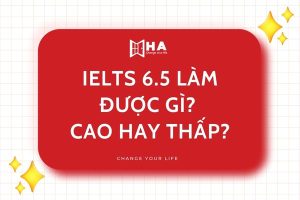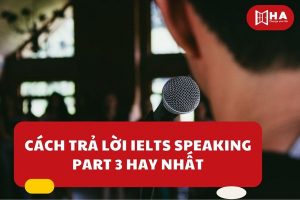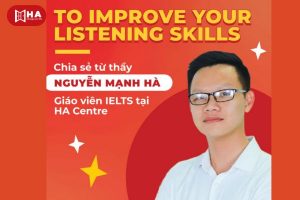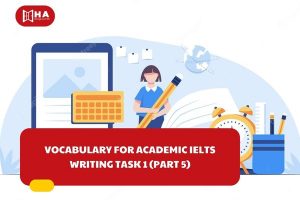Trong phần IELTS Speaking thì có part 3 là phần “khoai” nhất, khiến các bạn thí sinh oải và nản nhất. Để hỗ trợ bạn cải thiện điểm số phần part 3 Speaking này, hôm nay chúng mình tổng hợp lại các bài mẫu Speaking IELTS part 3 theo từng chủ đề điển hình để các bạn tham khảo. Ngoài ra, còn có cả link tải tài liệu 40 bài Mẫu IELTS Speaking Part 3 by Simon vô cùng chất lượng. Mọi người cùng đọc bài viết sau đây ngay nhé!

Các bài mẫu Speaking IELTS Part 3
1. Giới thiệu phần thi IELTS Speaking Part 3 là gì?
IELTS Speaking Part 3 là một trong những phần được đánh giá khó nhất trong bài thi kỹ năng IELTS Speaking. Giám khảo sẽ hỏi thí sinh một vài câu hỏi mang tính chất mở rộng và liên quan tới chủ đề ở part trước. Bạn có khoảng 4-5 phút để đưa ra câu câu trả lời một cách logic và chi tiết nhất có thể. Cách tiếp cận và hiểu được câu hỏi ở phần Part 3 là rất khó. Do đó, bạn cần có chiến lược làm bài tổng quan để áp dụng cho mọi chủ đề mà vẫn đảm bảo nâng cao điểm số. Bắt đầu phần chiến lược trả lời IELTS Speaking Part 3 thì việc đọc các bài mẫu tham khảo sẽ giúp bạn nắm bắt dễ dàng hơn.
2. Chiến lược trả lời Speaking part 3 hiệu quả
Để tránh bị bí ý hoặc chỉ trả lời được 2 – 3 câu, các bạn có thể áp dụng cấu trúc trả lời 3 bước sau đây:
| A: Answer | E: Explain | E: Example |
a/ Chủ thể nhắc đến trong Speaking part 3 không phải là ‘BẠN’
Nếu ở Part 1, 2, mục đích câu hỏi thường là về những điều xung quanh bạn, thì ở part 3, các câu hỏi mang tính học thuật rất cao, nghị luận về cuộc sống hoặc những gì xảy ra hàng ngày. Chính vì vậy, bạn cần tránh sử dụng ngôi số 1 để nói ở đây.
- How has public transport improved?
- Will Uber change anything?
- What would happen if they introduced transport passes?
b/ Các chủ đề trong Speaking part 3 cũng khá học thuật
Rất nhiều câu hỏi trong Speaking part 3 không khác gì so với task 2, cũng hỏi về sức khoẻ, giáo dục, môi trường …. chỉ khác là bạn không có thời gian để chuẩn bị. Việc giống nhau giữa 2 part sẽ khiến bạn bị bí cả ý tưởng lẫn từ vựng. Nhưng không phải là giống hoàn toàn, các chủ đề Speaking IELTS Part 3 có nhiều và cần bạn ôn luyện thật kĩ. Vậy nên, hãy chịu khó chuẩn bị ở nhà thật nhiều đề phong phú vốn từ, vốn suy nghĩ của mình.
c/ Speaking part 3 là một phần thi có sự tương tác lớn
Thay bằng việc giám khảo chỉ hỏi và bạn chỉ trả lời, với Speaking part 3, giám khảo sẽ lắng nghe những gì bạn cung cấp và ‘vặn vẹo’ thông tin khá nhiều. Họ liên tục đặt các câu hỏi để đào sâu vào câu trả lời của bạn trước đó.
d/ Thời gian cho Speaking part 3 kéo dài 4 đến 5 phút
Thời gian trả lời cho bài này ngang với speaking part 1. Tuy nhiên, đối với part 3, không có hạn chế về số lượng câu hỏi bạn được hỏi, giám khảo cứ duy trì cuộc thảo luận trong thời gian cho phép.
3. Các bài mẫu Speaking IELTS Part 3 theo chủ đề
a/ IELTS Speaking Part 3: ‘TV programme’ answers
Câu hỏi 1: Do you think most people watch TV for education or for entertainment?
I think people watch TV primarily for entertainment. There are far more entertainment programmes than educational ones, and in my experience most people treat television as a form of relaxation in the evening. If I think about the most popular TV programmes in the UK, such as talent shows like ‘X Factor’ or soap operas like ‘Eastenders’, the focus is definitely on entertainment rather than education.
Câu hỏi 2: Should TV play a role in educating children? How?
Yes, it definitely should play a role in my opinion. Good children’s TV programmes should tell stories that contain some kind of lesson about how to behave or what is morally right and wrong. Many of the traditional fairy tales, such as ‘Cinderella’, have been made into TV programmes, and there is always a postive message in those stories.
Câu hỏi 3: How do you think TV viewing habits change as people get older?
TV viewing habits obviously change a lot as we get older. While toddlers might watch programmes about talking animals, teenagers prefer action and adventure or sports, and as adults we start taking an interest in news and politics. My own preferences, for example, have changed over the years – I would never have watched news programmes when I was younger. I think it would be very strange if our viewing habits didn’t mature!
Vocabulary IELTS Speaking Part 3 TV programme:
Primarily: chủ yếu
Entertainment programmes:các chương trình giải trí
Educational ones: giáo dục
Treat television as a form of relaxation: coi truyền hình như một hình thức thư giãn
Talent shows: chương trình tài năng
Soap operas: các vở opera
Definitely: chắc chắn
Play a role in: đóng vai trò trong
How to behave: làm thế nào để cư xử
What is morally right and wrong: điều gì là đúng và sai về mặt đạo đức
Traditional fairy tales: truyện cổ tích truyền thống
A postive message: một thông điệp tích cực
Tv viewing habits: thói quen xem TV
Toddlers: trẻ mới biết đi
Prefer: thích hơn
Taking an interest in: quan tâm đến
Politics: chính trị
Preferences: sở thích
Strange: lạ
Mature: trưởng thành
b/ IELTS Speaking Part 3: ‘Tenses’ answers
Câu hỏi 1: Do you think films have changed since you were a child?
No, I don’t think films have changed much since I was a child. When I was younger I enjoyed watching action films, and the Hollywood formula for this type of film seems to be the same today. For example, I liked the original ‘Superman’ films, and superheroes are still a popular subject for film-makers.
Câu hỏi 2: As the technology for home viewing improves, do you think people will stop going to the cinema in future?
No, I don’t think that people will stop going to the cinema. People can already buy fantastic home viewing equipment, but it still feels more special to share the experience of watching a new film with a theatre full of people. I don’t think that technology will be able to replicate that cinema atmosphere.
Vocabulary IELTS Speaking Part 3 tenses:
Hollywood formula: công thức hollywood
Original: nguyên bản
A popular subject: một chủ đề phổ biến
Film-makers: nhà làm phim
Fantastic home viewing equipment: thiết bị xem phim ở nhà tuyệt vời
Be able to replicate: có thể thay thế
Cinema atmosphere: không khí điện ảnh/ không khí trong rạp chiếu phim
c/ IELTS Speaking Part 3: ‘Advice’ answers
Câu hỏi 1: Is it better to get advice from a friend or from a family member?
I think it depends on the kind of advice that you need. Parents and grandparents probably have more life experience than a friend, and so you might get a wiser or more sensible answer from them. On the other hand, friends are less likely to become too worried if you go to them with a problem. For example, I probably wouldn’t want to burden my parents with a financial problem.
Câu hỏi 2: What would you say are the characteristics of a good adviser?
Well, firstly, a good adviser should be a good listener, someone who takes the time to understand the situation before offering advice. Secondly, an adviser should try to be objective, and avoid judging the person who is seeking help. Finally, I think the best advisers have the ability to ask the right questions and encourage others to find their own answers.
Câu hỏi 3: Should people make their own work and career decisions, or is it a good idea to ask for advice about this?
I’d say that it’s a mixture of both things. Most of us talk to family, friends, teachers or colleagues before we make career choices. However, I believe that the final decision should rest with the individual; we all need to take ultimate responsibility for the big life choices that we make.
Vocabulary IELTS Speaking Part 3 Advice:
Depends on: phụ thuộc vào
Life experience: kinh nghiệm sống
Get a wiser or more sensible answer: có được câu trả lời khôn ngoan hay hợp lí hơn
Less likely to: ít có khả năng
Burden: gánh nặng
Financial problem: vấn đề tài chính
Good adviser: cố vấn tốt
Good listener: thính giả tốt
Takes the time to understand the situation: dành thời gian để hiểu tình hình
Offering advice: cung cấp lời khuyên
Objective: mục tiêu
Avoid judging: tránh đánh giá
Seeking help: tìm sự giúp đỡ
Have the ability to: có khả năng
Encourage: khuyến khích
A mixture: một hỗn hợp
Colleagues: đồng nghiệp
d/ IELTS Speaking Part 3: ‘Reading’ topic
Câu hỏi 1: Are the any occasions when reading at speed is a useful skill?
Personally, if I’m reading something interesting, I don’t like reading too quickly because I feel that I don’t properly absorb the information. However, it can be useful to skim through things when you don’t really want to read them, or when you just need to find one particular piece of information. For example, I read at speed when I’m checking a household bill or a letter from the bank.
Câu hỏi 2: Are there any jobs where people need to read a lot? What are they?
Well, researchers obviously need to read a lot, and I suppose that politicians, journalists and other professionals who need to know about current affairs read a lot too. Having said that, I think most workers read hundreds of emails every week. In my previous job, for example, I had to check internal staff emails at least twice a day.
Câu hỏi 3: Do you think that reading novels is more interesting than reading factual books? Why is that?
Both types of book can be equally interesting in my opinion. A good novel can transport you to another world where the characters in the book become almost real. On the other hand, factual books can give you fascinating insights into anything from psychology to ancient history.
Vocabulary IELTS Speaking Part 3 Reading:
Properly absorb the information: thấm thông tin 1 cách tốt
Skim through things: đọc lướt
One particular piece of information: một mẩu thông tin cụ thể
Read at speed: đọc ở tốc độ nhanh Checking a household bill: kiểm tra hóa đơn gia đình
Researchers: nhà nghiên cứu Suppose: giả sử
Politicians: chính trị gia Journalists: nhà báo
Professionals: chuyên gia Current affairs: thời sự
Previous job: công việc trước đó
Internal staff emails: email nhân viên nội bộ
Novel: tiểu thuyết
Transport you to another world: đưa bạn đến một thế giới khác
Characters: nhân vật
Become almost real: trở nên gần như thực Factual books: sách thực tế
e/ IELTS Speaking Part 3: ‘History’ topic
Câu hỏi 1: What do you think we can learn by studying events of the past?
I think we can learn a lot by studying history. Just as individual people learn from their mistakes, societies can learn from the mistakes made by previous governments or leaders. For example, from what I’ve read in the newspapers, many economists are looking back to the time of the Great Depression, around 80 years ago, in order to understand the financial crisis that is currently affecting many countries around the world. Even if we don’t always learn from mistakes, I think it’s fascinating to study history because it gives us an insight into who we are and where we come from.
Câu hỏi 2: What important events do you think might take place in the future?
It’s really difficult to predict what will happen in the future; most of the big, historic events of the past would have been impossible to foresee. For example, I don’t think that anyone living 100 years ago could have imagined that people would one day walk on the moon! If I had to guess what might happen in the future, I’d like to think that scientists will invent cures for diseases like cancer, and we’ll all live longer.
Vocabulary IELTS Speaking Part 3 Reading:
Learn from their mistakes: học hỏi từ những sai lầm của họ
Previous governments or leaders: chính phủ hoặc lãnh đạo trước đây
Economists: nhà kinh tế
Fascinating: hấp dẫn
Gives us an insight into: cung cấp cho chúng tôi một cái nhìn sâu sắc vào
Predict: dự đoán
Big: lớn
Historic events of the past: những sự kiện lịch sử trong quá khứ
Impossible to foresee: không thể thấy trước được
Walk on the moon: đi bộ trên mặt trăng
Guess: phỏng đoán
Invent cures for diseases: tìm ra phương pháp chữa bệnh
f/ IELTS Speaking Part 3: ‘politeness’ topic
Câu hỏi 1: In your country’s culture, how do you show that you are being polite?
We really value politeness and good manners in the UK, and there are many types of polite behaviour. One of the first things we learn as children is to say “please” and “thank you”. As adults, I think we are careful not to be too direct in the language we use. For example, we would never say “Bring me the bill” in a restaurant because this kind of direct instruction would sound rude. It would be much more polite to say “Could we have the bill, please?”.
Câu hỏi 2: Are we less polite with members of our families than with people we don’t know?
I suppose it’s normal to be a bit more relaxed about politeness with family members. Most people tend to speak in a more informal way at home; in the UK, we still say “please” and “thanks”, but it’s fine to use colloquial language and things like nicknames that you would never use with someone you didn’t know.
Vocabulary IELTS Speaking Part 3 Politeness:
Value politeness and good manners: tính lịch sự và cách cư xử tốt
Polite behavior: hành vi lịch sự
Careful: cẩn thật
Too direct in the language we use: quá trực tiếp bằng ngôn ngữ chúng tôi sử dụng
This kind of direct instruction: loại chỉ thị trực tiếp
Sound rude: âm thanh thô lỗ
A bit more relaxed: một chút thoải mái hơn
Politeness: tính lịch sự
Speak in a more informal way: nói một cách không chính thức
Colloquial language: ngôn ngữ không trang trọng
Nicknames: biệt danh
g/ IELTS Speaking part 3: rivers, lakes, sea
Câu hỏi 1: What do you think are the functions of rivers nowadays?
Trả lời: Rivers have various functions. In the UK, they were probably more important in the past because they were used for the transportation of goods, but I suppose this is still the case in many parts of the world. Rivers can be used as a source of renewable energy in the production of hydro-electric power, and they are also a source of fresh water for drinking and irrigation. Leisure activities are another function: fishing, canoeing, swimming, bathing… I’m sure there are many other things I haven’t thought of.
Câu hỏi 2: What do you think of boats and ships as forms of transportation?
Trả lời: I’m not really a fan of boats and ships. If I’m going abroad, I like to get to my destination quickly, so I prefer travelling by plane. Of course, ships are vital for the transportation of oil and other heavy cargo.
Câu hỏi 3: Why do some people like to live near rivers, lakes or the sea?
Trả lời: Well, the view is probably a major factor; most people like to look out to sea, or across a river or lake. I’d much prefer to look out of my window onto a natural landscape than an apartment building in a city. Then there’s the lifestyle: if you live by the sea, for example, you can lie on the beach, go for a swim, or do water sports like surfing or waterskiing. I definitely wouldn’t mind living near a beach at some point in my life!
Vocabulary IELTS Speaking part 3 Rivers, lakes, sea:
Various functions: các chức năng khác nhau
The transportation of goods: việc vận chuyển hàng hóa
This is still the case: đây vẫn là trường hợp/ vẫn phổ biến
A source of renewable energy: nguồn năng lượng tái sử dụng
Hydro-electric power: thủy điện
A source of fresh water for drinking and irrigation: nguồn nước sạch để uống và tưới tiêu
Leisure activities: hoạt động giải trí
Canoeing: chèo thuyền
Bathing: tắm
Boats and ships: tàu và thuyền
Get to my destination: đến đích/ điểm cần đến
Are vital for: có ý nghĩa quan trọng đối với
Oil: dầu
Heavy cargo: hàng nặng
The view: khung cảnh
Look out to sea: nhìn ra biển
Or across a river or lake: vượt qua sông hay hồ
Ngoài các bài mẫu trả lời của một số chủ đề hay gặp vẫn còn ebook 40 bài mẫu IELTS Speaking Part 3 By Simon PDF cho bạn tham khảo. TẢI XUỐNG
Hãy phá đảo phần thi Speaking part 3 này thật tốt bạn nhé!
Trên đây là tổng hợp các bài mẫu Speaking IELTS part 3 hay giúp bạn nâng cao band điểm phần nói. Nếu còn bất kỳ thắc mắc nào bạn có thể để lại gửi thông tin để chúng mình cùng biết nhé! Mọi vấn đề hãy liên hệ tới trung tâm HA Centre qua số Hotline: 032.7963.868 hoặc bạn vui lòng ĐỂ LẠI THÔNG TIN để nhận được những tư vấn chi tiết nhất.

















